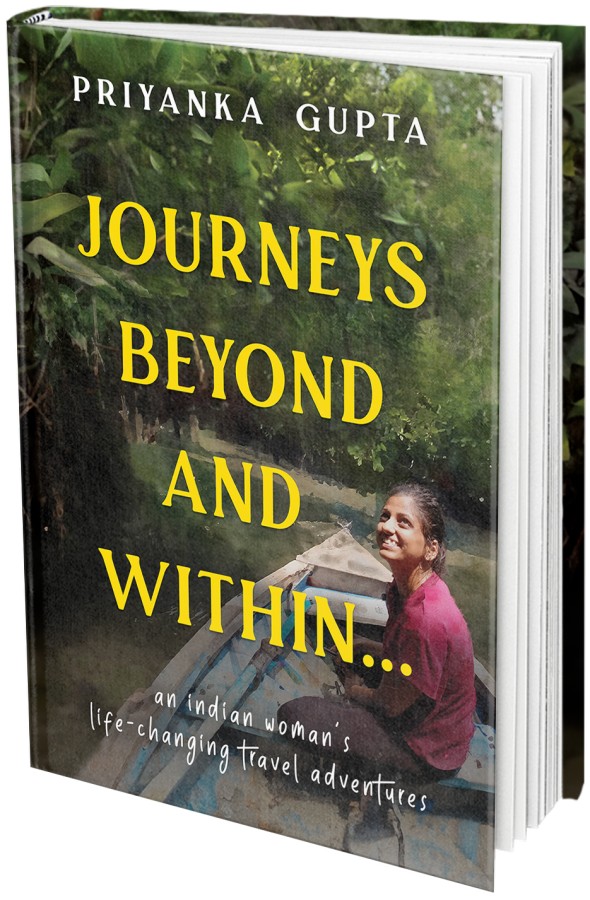In today’s noisy world, learning how not to care is indispensable.
But tell this to the neurons in our brain. They don’t rest even when we want to stop thinking. Sometimes, we cannot control our mind which runs around like a cat chasing its tail.
To pause our thoughts, we hang out with friends on Saturday evenings. We dance to rhythmic music or Netflix and drink — all to take our minds off things.
Imagine — if we could be in that thoughtless state most of the time. If we could block the redundant noise to focus on the important matter at hand. Or if we could just sit down quietly with a cup of tea on Sunday evening.
Practice being mindful (by doing meditation) helps. But we have to pull out some of our deep-rooted agonies otherwise even after a one-hour Vipassana we will be nourishing the same soul-sucking creepers that never bloom.
But what worries fill our minds?
Mostly we think about two kinds of things:
- The important ones
- And the ones that are not important
Unimportant things cloud our minds like the winter fog. Except that we rarely have a change of weather. Clear days with the sun shining bright outside our window are forever elusive.
Let us look at some of the fog that can be lifted to make way for sunlight.
Why and How Not to Care About These 14 Things
1. Whose mistake was it?
When our hotel booking got canceled, my friend shouted at me. She shouldn’t have.
What can I do about her raised voice now?
We will have to understand the other person’s circumstances before judging her. An opportunity for adventure to us could be threatening to our companion.
Life has put each one of us in a unique caravan comprising our body and mind. Now either we can drive along or jam into each other. I’m not such an experienced driver but even I can tell that bumping into someone isn’t going to bring much glory or peace.
When hurt, we should put our point across. But if we probe the wound too much, we will suffer more pain. And a time will come when we will just be accusing the other to put her down.
The best we can do is to drive on and let the past rest behind. The next time we drive by the bygones we will find wildflowers of the present enveloping the ruins.
The next time you want to continue blaming someone, ask yourself — Am I perfect?
Also Read: 30 life lessons I collected from the 20’s.
2. Are they fair?
I always go to see her, but she never comes. My parents turned my room into comic book storage. I was dumped. Nothing is fair.
We try to evaluate our and others’ actions. But everything does not have a fair or unfair dimension.
Perhaps she is intimidated by your well-kept home. Perhaps they missed you too much to keep the memories intact. Perhaps you had broken her heart.
How can all things be either black or white in this colorful complex world?
Learning to not care about fairness all the time is an indispensable step to achieve a healthy and happy mind and body.
3. Doing everything at the right age
I started cycling to school when I wasn’t even ten years old. At 15, I left home to study 700 km away from home alone. When I was 22, I fumbled while getting on escalators. At 29, I quit my banking job to write. When I was 30, I was unmarried. At 33, I don’t have a permanent address (but who cares when I can pluck papayas from my guesthouse).
Despite how blasphemous these statements might seem, I’m fulfilled, secure, and driven.
Thinking about doing everything at the right age is like baking a cake at 220 degrees celsius. But life isn’t a set recipe. Numbers are to help us put things in perspective, not to be the driving force behind our decisions.
As long as you are sure about your path, what’s the problem?
The real thing is life, not the metric system we put in to sail through. (and other things I told my younger self.)

4. “How could they say that” or “what would they think or say”?
Human beings are the most unpredictable species on this planet. We are all different, and we can think, say, or do anything anytime.
Remember world wars, invasions over trivia, men on the moon, fights over abortion rights, murders over rumors, empires donated to the poor, paintings auctioned for millions, iron rockets, genetically modified sheep — every blunder more wonder and every wonder more blunder. We are capable of anything.
Knowing this, we all care too much about what others think.
Often, I forget about the irrationality of humans (or we can call it emotional choreography). But they are quick to remind me. Then I spend my energy on moving on rather than brooding over why someone said what they said.
When we try to control something out of our control, we suffer.
5. What do you have that I haven’t asked for? a.k.a. Shopping
Clothes fall out of our wardrobes and laundry bags. But we still care if Zara has launched the latest summer collection. We have so many plates in the kitchen and vegetables in the refrigerator we can feed a theatre packed with people with leftovers for Mrs. Potbelly, the cat.
Remember the long queue outside the Apple stores the day the new iPhone is released?
Thanks to consumerism and capitalism, our needs have transformed into a never satiating thrust for more. And we don’t even notice but we spend a lot of time not only looking, buying, maintaining, and getting rid of things, but also dreaming about them.
Every week I buy groceries. But when I find myself making excuses to visit the shop even if I don’t need that slab of butter, I do something else more fun or productive. Thus, I also save the future me from the unwarranted burden of caring for the impulsive purchase.
If we buy what we need (because the market isn’t going to run away), life simplifies a lot.
An itinerant writer who boys one pair of clothes only after discarding an old one.
6. What is the latest hashtag?
Most of the hashtags don’t affect us until we introduce them into our lives, and then they don’t leave us alone. (Update May 2022: #HindusMustUnite is forever trending. But why?)
Hashtags are symbolic of any concept we pay attention to. Just because something exists doesn’t mean it should concern us. Choose what you fill your mind with utmost care.
If something doesn’t add value to our life — or takes away from it — should it be part of us?

7. Winning an argument. Being right. Getting the last say.
In this Ted talk, an Indian actor Sumeet Vyas said he struggled for fifteen years before he was noticed. During those years a lot of people advised him. He listened to them quietly and did what he wanted to do.
Vyas could have argued he knew what was best for him. If you make it — everything becomes an argument.
Everyone thinks about the same thing differently. In our minds, we are right, and they are not. But by winning an argument, we cannot change anyone’s point of view.
Let us say, you prefer organic farming, but your friend doesn’t. But quarreling about how right you are and how wrong he is isn’t going to change his ideas immediately. Instead, a calm conversation might make him listen more.
The need to have the last say only shows our weakness. In our desperation to be right, we become addicted, and, thus, restless to the nod of approval from others.
We should express our opinion and then let the other person speak. If we discuss aggressively to win an argument, everyone will become defensive and disagree with us. (and other ways to form relationships with people.)
I thought he was far towards the right. But he said I had moved so far left he couldn’t even see me.
8. Break Ups
I have spent years getting over a breakup. Freshly hurt, I thought I will never be happy again. But now if someone asks about my well-being, I say I couldn’t be more content.
When we have just parted ways from our love, we are miserable. Past the bridge over the river of tears, we feel good. But what matters is the walk over the bridge.
Irrespective of how rough the waters get, we can decide how hard we want to paddle. The more desperately we try, the deeper we sink. But if we take a moment, look around, and let ourselves float, we are bound to find an island. Meanwhile, we can appreciate the beauty of the world which suddenly seems so profound from behind our pain-swathed glasses.
I have seen the statement “whatever happens happens for good” being proven right way too many times. And if that breakup wasn’t justified, you would find the same person back again. (getting dumped can also do good.)
9. What if we fail? Are we going in the right direction? a.k.a. Ego
Remember the cliche: if you never try, you have already failed.
Most people achieve what they do by following the path and not caring about the result. If we keep thinking about the summit, the journey becomes even steeper (I can tell from personal experience as a coder turned writer.).
I’m not suggesting we don’t have an eye on the goals at all. But instead of wondering if we are heading in the right direction daily, we should evaluate our path once in a while.
Many people are waiting to tell you, “see, we told you not to go down that road.” And their remarks can hurt our ego.
But
every time we fail, we can learn how to be better.
Let us not be defined by our failures. (As Ryan Gosling said, “Ego is the Enemy” and “The Obstacle is the Way“.)

10. the Conundrum of Money
“Earning as much as we can” might not be the best way to live — despite popular opinion. After we have attained the essentials, health insurance, and saved, what do we do with the rest of the zeroes in the bank account? They make more money and all of that together makes more and then? Did you say for future generations? Then what will they do with their lives? (Having said this, I recommend investing your funds to grow them and catch up with inflation. Thus you have to worry less about money while earning on what you have already earned.)
Remember, money is not real even if we have coins clattering in our hands and bills billowing out of our wallets. We invented money to transact easily. But now Nifty, Fed Reserves, and Reliance stocks run not only the markets but our lives too.
If making more money is negatively affecting your life (read no time to play, eat, live, be with family — things you should care about), rethink what you need so much money for.
Yes, more money brings power. But is it worth the price?
11. The fear of missing out
I want to sit and work on my idea and not go to this stupid party on Friday. But they will drink daiquiris, eat empanadas, and party all night. I will miss out on so much fun. But I don’t even like those people? But the fun?
How to care less about what others are doing?
We don’t lose out until we are at ease with who we are and what we are doing. And we don’t have to do the same things other people do to make the best of our time.
We only start missing out when we think we are missing out. (and other lessons to excel in our 30s)
12. Pleasing people
People are not machines. We can try and try but we cannot make everyone happy.
Every time you find yourself trying to please people or if you are unhappy because someone is upset with your choices or who you are or what you do, ask yourself: what would change if they like me? More importantly, what would change if they don’t like me?

13. Jealousy
Gossiping about who turned vegan recently, the expensive foreign tour the neighbor took, or whose dress is handcrafted, we get energized, but only momentarily. Soon we become addicted to focusing on others’ lives. All those social media feeds we scroll through or the time we spend engaging with celebrity news make us jealous, negative, and unhappy.
A picture-perfect life of someone else can shadow the blossoms of our garden. Evolution has taught us to want the best for ourselves.
If another human being can do it, we can do it too: that’s the inspiration we should take from others’ moments. Let’s shed off jealousy. Let’s focus on our growth.
And let’s ask ourselves – do we even care for the thing in the first place?
14. Am I happy?
Being happy is not something to do. Let’s not make it an activity.
Life is an ocean and happiness should be its salt, always dissolved in it, inseparable.
The next time we overthink something, let’s ask ourselves: does the thing even matter?

Feature image courtesy: Nicolas Lancret, Public domain, via Wikimedia Commons
What are your ideas on how to care less? Let me know in the comments.
Please pin and share my article with the world if you liked it. Thank you.
*****
My much-awaited travel memoir
Journeys Beyond and Within…
is here!
In my usual self-deprecating, vivid narrative style (that you love so much, ahem), I have put out my most unusual and challenging adventures. Embarrassingly honest, witty, and introspective, the book will entertain you if not also inspire you to travel, rediscover home, and leap over the boundaries.
Grab your copy now!
Ebook, paperback, and hardcase available on Amazon worldwide. Make some ice tea and get reading 🙂
*****
*****
Want similar inspiration and ideas in your inbox? Subscribe to my free weekly newsletter "Looking Inwards"!



Nice Article Priyanka. I specially related with your #13. Pleasing people.
Also, got a good aha moment on #15. Am I happy? It is such a nice thought. Happiness should be just in the background and always present 🙂
Great Article.. keep writing.
Thank you. Keep reading 🙂
I’m so glad you enjoyed the piece. Hope you are still hanging out here 🙂
Good food for thought, dear. Thank you.
You are welcome Carolina. Thanks for stopping by 🙂
Good reading, you are so right Priyanka 🙂
Thanks Angelica. Glad you liked the post. 🙂
Stay in touch. Would love to hear more from you.
A great topic, Priyanka. Loved the line, “Life is an ocean and happiness should be its salt”. 🙂 A terrific way to perceive happiness.
Thanks thea. Glad you liked it 🙂
Please keep visiting and reading.
Love,
Priyanka
Really good!
Thanks Shanky 🙂
Glad you liked it. Please keep reading.
I have an exclusive newsletter that I send out on Friday to subscribers. You can subscribe if would like that.